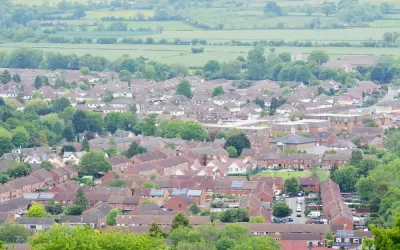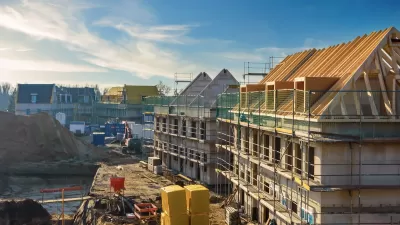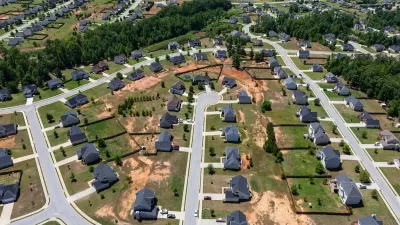The green belts that hem in developed areas in Great Britain are set arbitrarily, according to this op-ed in The Guardian, and the boundaries have outlived their usefulness.

John Elledge argues that it's time to rethink the urban growth boundaries, or greenbelts, of U.K. land use and growth policy. Elledge begins the argument by noting the lost opportunities that the policy has embedded into the country.
The creation of the metropolitan green belt fixed the boundaries of London as wherever the suburbs happened to stop. So Goodwood Avenue stops midway at an unconvincing simulacrum of countryside that’s hemmed in by homes on three sides. There are two tube stations within a mile, yet despite the housing shortage, there’s no building on this land. Not because it’s unsuitable; simply because nobody’s ever built there.
Despite the compelling case made for greenbelts at one point in development and land use planning history (a case made capably and sympathetically in this op-ed), Elledge argues that it's time to rethink growth strategy around the country, because a lack of space is a leading cause of the nation's housing crisis.
Elledge acknowledges that neither the nation's prominent politicians, nor residents of the suburbs, support proposals to loosen their green belts. But in the meantime, "[t]hey are selling younger people down the river." But "gradually, the group that benefits from the green belt is shrinking, and the group it blights is growing. Younger people vote now, too."
FULL STORY: Loosen Britain’s green belt. It is stunting our young people

Planetizen Federal Action Tracker
A weekly monitor of how Trump’s orders and actions are impacting planners and planning in America.

San Francisco's School District Spent $105M To Build Affordable Housing for Teachers — And That's Just the Beginning
SFUSD joins a growing list of school districts using their land holdings to address housing affordability challenges faced by their own employees.

The Tiny, Adorable $7,000 Car Turning Japan Onto EVs
The single seat Mibot charges from a regular plug as quickly as an iPad, and is about half the price of an average EV.

As Trump Phases Out FEMA, Is It Time to Flee the Floodplains?
With less federal funding available for disaster relief efforts, the need to relocate at-risk communities is more urgent than ever.

With Protected Lanes, 460% More People Commute by Bike
For those needing more ammo, more data proving what we already knew is here.

In More Metros Than You’d Think, Suburbs are Now More Expensive Than the City
If you're moving to the burbs to save on square footage, data shows you should think again.
Urban Design for Planners 1: Software Tools
This six-course series explores essential urban design concepts using open source software and equips planners with the tools they need to participate fully in the urban design process.
Planning for Universal Design
Learn the tools for implementing Universal Design in planning regulations.
Smith Gee Studio
City of Charlotte
City of Camden Redevelopment Agency
City of Astoria
Transportation Research & Education Center (TREC) at Portland State University
US High Speed Rail Association
City of Camden Redevelopment Agency
Municipality of Princeton (NJ)





























